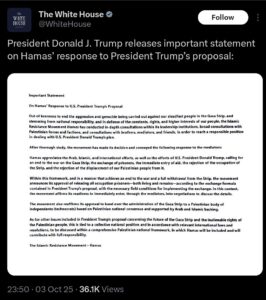
AP Photo/Alex Brandon
The U.S. Court of Appeals for the First Circuit dropped a legal smackdown on President Donald Trump’s efforts to revoke birthright citizenship, eviscerating the administration’s arguments in a 100-page opinion.
One of the first executive orders Trump signed to kick off his second term was one that purported to end birthright citizenship. It was swiftly challenged in court by multiple plaintiffs in multiple states and by several blue state governments as well.
In June, the Supreme Court rolled back the ability of lower federal courts to issue nationwide injunctions blocking the executive order from being implemented, but the various court proceedings have put injunctions back in effect, including a July ruling from a three-judge panel on the 9th Circuit Court of Appeals that issued an injunction blocking the Trump administration from denying citizenship to people born in the U.S. to parents who are here illegally or temporarily.
This latest opinion was a three-judge panel for the First Circuit that included Chief Judge David J. Barron, Judge Julie Rikelman, and Judge Seth R. Aframe. Barron was appointed by President Barack Obama; the other two judges were appointed by President Joe Biden.
The 100-page opinion by Barron begins by quoting America’s “longstanding guarantees of birthright citizenship,” starting with the first clause of the Fourteenth Amendment, passed in the wake of the Civil War, which states, “[a]ll persons born or naturalized in the United States, and subject to the jurisdiction thereof, are citizens of the UnitedStates and of the State wherein they reside.”
Congress followed up nearly a century later, Barron noted, “after a thorough review of our nationality laws,” and passed the Immigration and Nationality Act, which includes similar language providing that “a person born in the United States, and subject to the jurisdiction thereof” “shall be [a] national[] and citizen[] of the United States.”
The court flatly rejects the Trump administration’s efforts to reverse the preliminary injunctions blocking the president’s executive order on birthright citizenship. “We see no reason to do so,” Barron wrote, and the government was “therefore wrong to argue that the plaintiffs are not likely to succeed in showing that the children that the [executive order] covers are citizens of this country at birth.”
Before getting into the details of the government’s specific arguments, Barron made a point of highlighting that the opinion might be “necessarily lengthy,” but the actual legal question was simple and clear:
The analysis that follows is necessarily lengthy, as we must address the parties’ numerous arguments in each of the cases involved. But the length of our analysis should not be mistaken for a sign that the fundamental question that these cases raise about the scope of birthright citizenship is a difficult one. It is not, which may explain why it has been more than a century since a branch of our government has made as concerted an effort as the Executive Branch now makes to deny Americans their birthright.
Politico senior legal affairs reporter Kyle Cheney reacted to this section of the opinion by writing this was the court saying it was “unequivocally, lopsidedly easy to determine that the Trump administration’s view of birthright citizenship is wrong.”
The opinion concludes by directly connecting the efforts of the current administration to past shameful examples from U.S. history, and holds that the nationwide injunction blocking the Trump executive order could remain in place (citations omitted):
Our nation’s history of efforts to restrict birthright citizenship — from Dred Scott in the decade before the Civil War to the attempted justification for the enforcement of the Chinese Exclusion Act in Wong Kim Ark — has not been a proud one. Indeed, those efforts each have been rejected, once by the people through constitutional amendment in 1868 and once by the Court relying on that same amendment three decades later, and at a time when tensions over immigration also were high. Even the denial of citizenship to Native American tribal members no longer persists, thanks to a statute passed more than a century ago.
The “lessons of history” thus give us every reason to be wary of now blessing this most recent effort to break with our established tradition of recognizing birthright citizenship and to make citizenship depend on the actions of one’s parents rather than — in all but the rarest of circumstances — the simple fact of being born in the United States. Nor does the text of the Fourteenth Amendment, which countermanded our most infamous attempt to break with that tradition, permit us to bless this effort, any more than does the Supreme Court’s interpretation of that amendment in Wong Kim Ark, the many related precedents that have followed it, or Congress’s 1952 statute writing that amendment’s words in the U.S.Code.
–
The post Federal Appellate Court Obliterates Trump Admin’s Arguments Against Birthright Citizenship first appeared on Mediaite.














